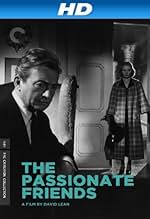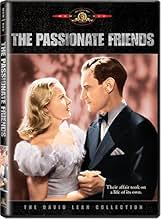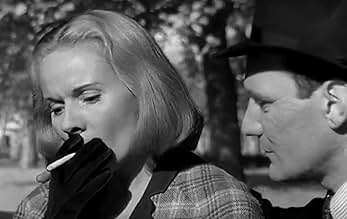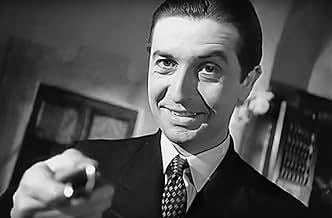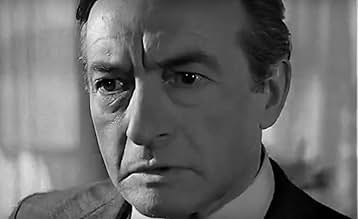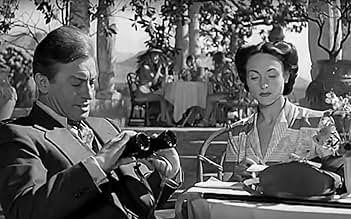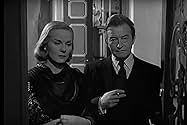AVALIAÇÃO DA IMDb
7,2/10
3,3 mil
SUA AVALIAÇÃO
Uma mulher conhece um homem cujo amor ela rejeitou anos atrás.Uma mulher conhece um homem cujo amor ela rejeitou anos atrás.Uma mulher conhece um homem cujo amor ela rejeitou anos atrás.
- Direção
- Roteiristas
- Artistas
- Prêmios
- 2 vitórias e 1 indicação no total
Hélène Burls
- Flowerwoman
- (não creditado)
Amy Dalby
- Lady on Underground
- (não creditado)
Lisa Daniely
- Cinema Usherette
- (não creditado)
Max Earle
- Third Man - Albert Hall
- (não creditado)
Edward Evans
- Underground ticket officer
- (não creditado)
Arthur Howard
- Smith - Butler
- (não creditado)
John Huson
- First Man - Albert Hall
- (não creditado)
Wilfrid Hyde-White
- Lawyer
- (não creditado)
Charles Lloyd Pack
- Man Drinking with Stratton
- (não creditado)
Guido Lorraine
- Hotel Manager
- (não creditado)
Ina Pelly
- Second Woman - Albert Hall
- (não creditado)
Helen Piers
- First Woman - Albert Hall
- (não creditado)
Marcel Poncin
- Hall Porter
- (não creditado)
Avaliações em destaque
Invariably this film is bound to be compared to "Brief Encounter" and I guess that's to be expected given they were both directed by David Lean, starred Trevor Howard and featured adultery. Frankly I think any comparison to be unfair because that's where their similarities end. I've seen both and I favor "Passionate Friends". I should add that Ann Todd is not one of my favorite performers. Her demeanor can be expressionless and somewhat off putting. But here she truly shines. In Lean's extensive close ups she reveals inner feelings without uttering a word. And her smiles are explosively radiant. She utterly owns this part. The male parts are equally excellent. All the performances wrap the viewer with their passion and involve him in the characters' fates. This is not light viewing. It's an emotional roller coaster and as the climactic finale unfolded I found myself talking to the screen trying to influence the outcome. Without a doubt this is a story by adults, for adults. Highly recommended.
It's easy to associate "The Passionate Friends" to its detriment with "Brief Encounter"; in its voice-over/flashback structure, in its themes of suicide and adultery, and of course in the casting of Trevor Howard. But in a sense -- although not, unfortunately, an entirely successful one -- in a sense, the later film is an attempt to do something very different with this source material. At the most basic level the two pictures have virtually nothing in common: "Brief Encounter" is a story of renunciation and unselfishness, of ordinary lives in an unromantic setting, of heartbreak from a painfully honest narrator. "The Passionate Friends" (a title never really explained) revolves ultimately around selfishness and self-deception, lavish trappings and a shallow surface gloss epitomised by the cheesy 'Swiss' tourist music that backs the initial establishing shots.
Mary's swelling soft-focus memories of her grand passion are deflated by jarring little jabs from the director, in what I suspect is intended as an alert to the viewer that her romantic-seeming situation is not quite what it seems -- in effect, she is an unreliable narrator, and the pay-off comes when she perceives, finally and appallingly, what she really is and what she has done. It is a climax worth waiting for, but it is slow to arrive; and the subtle wrongness in the love affair, the self-dramatisation and lack of authenticity (whether or not these are deliberate attempts to undermine her presentation of events, as hindsight suggests they may be) until then tend to come across simply as unconvincing story-telling.
It is never clear just what Mary means by her assertion that she wants to belong to herself and not to any lover. By the end, however, it is all too apparent that this mantra, reminiscent of the "Can't tie me down, babe" slogans of the (male) serial shaggers of the Sixties, is every bit as self-indulgent a female pose. She is in love with the idea of being in love: playing at it, day-dreaming transgressions. But when reality strikes, the whole game is exposed as a silly, hugely destructive fantasy.
After the first showdown with her husband (which we are specifically, and with hindsight, significantly, not allowed to witness), she warns Steven that she is not truly a good person to love. We -- and he -- do not then either understand or believe her; but she is right. She is not prepared to give herself, in modern parlance to 'commit': but she will not let go either.
The trouble for me is that for most of its running length the film seems to be simply a somewhat off-kilter account of an adulterous affair, over-ponderous, with clumsy use of music and heavily ironic dialogue. (The cinema audience, young and out for a good time, spent rather more time giggling than I assume the director intended.) The cinematic tricks that are present, such as the abrupt cuts in the taxi scene, the nested flashback structure, or the montage of advertisements in the Tube station reading "Keep Smiling", "Strength" and "Saved", too often seem awkward or labouring the obvious. If the idea was indeed to subtly undermine audience preconceptions, it doesn't really work -- there is no equivalent here to the stunning shift in perception that exists between the opening sequence of "Brief Encounter" and the final unwinding of the flashback.
As the ambiguous Mary, Ann Todd is a strangely elusive presence. The character is at the heart of the plot and has the lion's share of screen time, and yet most of that time it's hard to get a grip on her beyond the superficial. I'm still not sure whether this is an intended result of the acting and/or direction, or a flaw in the film.
Trevor Howard carries off the role of the unfortunate Steven with angular charm and provides the requisite sense of bewildered decency; but as others have rightly remarked, it is Claude Rains, in what might appear a largely peripheral role, who steals the show. Rich, older, physically unprepossessing, and mildly affectionate towards his wife when he can spare a moment from the financial markets, Howard Justin is the face of moneyed security versus the romantic passion promised by Mary's once-and-future lover, and as such represents the trappings of a marriage of convenience rather than an actual human being. But almost from the beginning we are made aware that he is neither unintelligent nor unobservant; later we discover that he is not as complaisant as the other couple have assumed, and finally, that he can be hurt -- and can love -- as deeply as any other man. Over a mere handful of scenes in the course of the film Claude Rains manages to convey more tension and real emotional presence than anyone else, and it is this contribution that makes the final twist both plausible and satisfying.
"The Passionate Friends" is not the great film that I feel it is perhaps trying to be; but it is certainly not an abortive carbon-copy of "Brief Encounter". The resolution of the film is starkly effective and is worth sitting through a glossy and rather uninspired beginning for: as a whole, it can be seen as an honourable failure.
(Edit: for what it's worth, in the month since I saw this film I haven't been able to get it out of my head...)
Mary's swelling soft-focus memories of her grand passion are deflated by jarring little jabs from the director, in what I suspect is intended as an alert to the viewer that her romantic-seeming situation is not quite what it seems -- in effect, she is an unreliable narrator, and the pay-off comes when she perceives, finally and appallingly, what she really is and what she has done. It is a climax worth waiting for, but it is slow to arrive; and the subtle wrongness in the love affair, the self-dramatisation and lack of authenticity (whether or not these are deliberate attempts to undermine her presentation of events, as hindsight suggests they may be) until then tend to come across simply as unconvincing story-telling.
It is never clear just what Mary means by her assertion that she wants to belong to herself and not to any lover. By the end, however, it is all too apparent that this mantra, reminiscent of the "Can't tie me down, babe" slogans of the (male) serial shaggers of the Sixties, is every bit as self-indulgent a female pose. She is in love with the idea of being in love: playing at it, day-dreaming transgressions. But when reality strikes, the whole game is exposed as a silly, hugely destructive fantasy.
After the first showdown with her husband (which we are specifically, and with hindsight, significantly, not allowed to witness), she warns Steven that she is not truly a good person to love. We -- and he -- do not then either understand or believe her; but she is right. She is not prepared to give herself, in modern parlance to 'commit': but she will not let go either.
The trouble for me is that for most of its running length the film seems to be simply a somewhat off-kilter account of an adulterous affair, over-ponderous, with clumsy use of music and heavily ironic dialogue. (The cinema audience, young and out for a good time, spent rather more time giggling than I assume the director intended.) The cinematic tricks that are present, such as the abrupt cuts in the taxi scene, the nested flashback structure, or the montage of advertisements in the Tube station reading "Keep Smiling", "Strength" and "Saved", too often seem awkward or labouring the obvious. If the idea was indeed to subtly undermine audience preconceptions, it doesn't really work -- there is no equivalent here to the stunning shift in perception that exists between the opening sequence of "Brief Encounter" and the final unwinding of the flashback.
As the ambiguous Mary, Ann Todd is a strangely elusive presence. The character is at the heart of the plot and has the lion's share of screen time, and yet most of that time it's hard to get a grip on her beyond the superficial. I'm still not sure whether this is an intended result of the acting and/or direction, or a flaw in the film.
Trevor Howard carries off the role of the unfortunate Steven with angular charm and provides the requisite sense of bewildered decency; but as others have rightly remarked, it is Claude Rains, in what might appear a largely peripheral role, who steals the show. Rich, older, physically unprepossessing, and mildly affectionate towards his wife when he can spare a moment from the financial markets, Howard Justin is the face of moneyed security versus the romantic passion promised by Mary's once-and-future lover, and as such represents the trappings of a marriage of convenience rather than an actual human being. But almost from the beginning we are made aware that he is neither unintelligent nor unobservant; later we discover that he is not as complaisant as the other couple have assumed, and finally, that he can be hurt -- and can love -- as deeply as any other man. Over a mere handful of scenes in the course of the film Claude Rains manages to convey more tension and real emotional presence than anyone else, and it is this contribution that makes the final twist both plausible and satisfying.
"The Passionate Friends" is not the great film that I feel it is perhaps trying to be; but it is certainly not an abortive carbon-copy of "Brief Encounter". The resolution of the film is starkly effective and is worth sitting through a glossy and rather uninspired beginning for: as a whole, it can be seen as an honourable failure.
(Edit: for what it's worth, in the month since I saw this film I haven't been able to get it out of my head...)
6sol-
A rather early entry in David Lean's career, his directing skills show through in some dramatic moments that require intense atmosphere. Nevertheless, the film is not the best example of Lean's abilities - both before and after it he directed superior productions - but this one is still okay viewing. With many flashbacks melded in with the plot, some are better done than others, and likewise, sequences showing the thoughts and dreams of the characters vary in effectiveness. There is a memorable sequence that features multiple telephone tracks, and there are also a few other neat tricks in the mix. The cinematography is quite good, and the cast keeps the film at an interesting level. Still, it is primarily of interest to followers of Lean's work.
For The Passionate Friends David Lean treads similar ground as he does in his masterpiece, Brief Encounter, although here the source material is an HG Wells story as opposed to a Noel Coward play.
The post-war Lean, with his attention to psychology and emotions, handled these stories of problematic romance brilliantly, and The Passionate Friends is a great example. We open with clouds and snow-capped mountains, a holiday location that foreshadows Lean's Summertime (1955), straight away giving us a sense of dreaminess and soaring emotions.
This is Lean at his most psychological and expressionist. The sound and imagery is always calculated to mirror feelings – like the abruptness of the plane wheel touching the ground when Claude Rains returns from his trip abroad. The acting really supports this too. Considering it's a story about a love triangle, a large amount of the story is told through scenes in which one of the three principal characters is alone, or at least unobserved, and the actors convey inner thoughts through subtle expressions and gestures.
Also, like the bulk of Lean's pictures from this era there are references to the war and the impact it had on British society. It's probably no coincidence that the decision was made to set the flashbacks of the affair in 1939 (Wells' original story was decades older), the year that war broke out. The cold, bureaucratic Claude Rains seems to be in part symbolic of the necessity in wartime to be rational and emotionless, and the story is an allegory for the need to break away from that.
While it is a good story and very well-made, The Passionate Friends is unfortunately no Brief Encounter. On the acting side, Claude Rains is brilliant as always, but I'm less convinced by Ann Todd, who perhaps got the part more because she was Mrs Lean that for her talent. The plot can be a bit confusing with its flashbacks within flashbacks. Probably the biggest problem though is that we never get to totally empathise with the characters. While Brief Encounter's sheer ordinariness made it so universal, you don't get this to the same degree here, and that makes it by far the weaker of the two pictures. Still, it's by no means a disaster, and still one of the better films of David Lean's 1940s output.
The post-war Lean, with his attention to psychology and emotions, handled these stories of problematic romance brilliantly, and The Passionate Friends is a great example. We open with clouds and snow-capped mountains, a holiday location that foreshadows Lean's Summertime (1955), straight away giving us a sense of dreaminess and soaring emotions.
This is Lean at his most psychological and expressionist. The sound and imagery is always calculated to mirror feelings – like the abruptness of the plane wheel touching the ground when Claude Rains returns from his trip abroad. The acting really supports this too. Considering it's a story about a love triangle, a large amount of the story is told through scenes in which one of the three principal characters is alone, or at least unobserved, and the actors convey inner thoughts through subtle expressions and gestures.
Also, like the bulk of Lean's pictures from this era there are references to the war and the impact it had on British society. It's probably no coincidence that the decision was made to set the flashbacks of the affair in 1939 (Wells' original story was decades older), the year that war broke out. The cold, bureaucratic Claude Rains seems to be in part symbolic of the necessity in wartime to be rational and emotionless, and the story is an allegory for the need to break away from that.
While it is a good story and very well-made, The Passionate Friends is unfortunately no Brief Encounter. On the acting side, Claude Rains is brilliant as always, but I'm less convinced by Ann Todd, who perhaps got the part more because she was Mrs Lean that for her talent. The plot can be a bit confusing with its flashbacks within flashbacks. Probably the biggest problem though is that we never get to totally empathise with the characters. While Brief Encounter's sheer ordinariness made it so universal, you don't get this to the same degree here, and that makes it by far the weaker of the two pictures. Still, it's by no means a disaster, and still one of the better films of David Lean's 1940s output.
The Passionate Friends (1949)
You wonder how this movie would be told without the Hays Code (and its British counterpart) hovering over the scriptwriter and director. But here we have David Lean's version of the much older H.G. Wells novel (from just before WWI) with all the restraint of movie romances of the period. That is, without our modern idea of passion.
And that's one of the things that makes this really work. It's not about making love on the sly, or going rapturous on screen. It's about the complicated emotional needs and conflicts of three people. That's what passion boils down to, at least in a way that we want to spend time with. And though this is not a full fledged love triangle like "Jules and Jim" (it's one woman caught between two men), it does play with the clashing and melding of three personalities and their passions.
Oddly, you learn fairly soon that the passion of the older man, played by Claude Rains, is deliberately not passionate. That's not what he wants in love. The younger man (not by much) is played by Trevor Howard and he is a sweetheart, with a family, and yet he still has that pure ideal love for the woman he can't shake. Even though she is married to the older man.
The woman holds it all together, both in the story, since she is involved with both men, and in the movie, played with amazing force and nuance by Ann Todd. When she first appeared on screen, thinking to herself on a plane taking off, I thought she was a little like Joan Fontaine, and since I love Fontaine, I was going to be open to this inferior version. But she wasn't inferior one bit. The longer the movie went on, the more I realized what a deeply felt, complex performance Todd gives. She not only has to be a different kind of woman with each of the men, she has to do so in different time periods over about eight years. Great stuff. I want to watch it again just to appreciate her. She was almost wholly a British actress, not moving to Hollywood, and so she never had an American audience the way some of the more famous stars here naturally did. Too bad for everyone.
The movie, as such, has a little inevitability to it--not that we know how it will end, exactly, but that we know how it will probably end, the one or two main options. The rivalry, the jealousy, the caught looks across a train station, the views from the Italian Villa, all the clichés are here. They are all perfectly handled, for sure, but an edge of originality would have helped a lot. I'm very curious to read the Wells book just to see how complex he makes the woman, and the story. And to check the ending he had in mind in 1913.
Lean, the director, is a legend of course. He made so many really fine films, important ones, it's easy to overlook this one. Even the slightly similar (in feel) "Brief Encounter" from 1945 casts a huge shadow here. Throw in "Lawrence of Arabia," "Dr. Zhivago," "Blithe Spirit," "Bridge over the River ." You get the idea.
See this. Expect nothing sensational, and you'll be sucked into a really superb, conventional, beautiful romantic drama. I just read (and gave a thumbs up) to a long review for this film that seems incredibly perceptive, but which maybe forces too much analysis onto the motives of the players here--especially for someone who hasn't seen it yet. I suggest getting sucked in and taking the advice to be patient, but also forging your own view of the events and hearts involved.
You wonder how this movie would be told without the Hays Code (and its British counterpart) hovering over the scriptwriter and director. But here we have David Lean's version of the much older H.G. Wells novel (from just before WWI) with all the restraint of movie romances of the period. That is, without our modern idea of passion.
And that's one of the things that makes this really work. It's not about making love on the sly, or going rapturous on screen. It's about the complicated emotional needs and conflicts of three people. That's what passion boils down to, at least in a way that we want to spend time with. And though this is not a full fledged love triangle like "Jules and Jim" (it's one woman caught between two men), it does play with the clashing and melding of three personalities and their passions.
Oddly, you learn fairly soon that the passion of the older man, played by Claude Rains, is deliberately not passionate. That's not what he wants in love. The younger man (not by much) is played by Trevor Howard and he is a sweetheart, with a family, and yet he still has that pure ideal love for the woman he can't shake. Even though she is married to the older man.
The woman holds it all together, both in the story, since she is involved with both men, and in the movie, played with amazing force and nuance by Ann Todd. When she first appeared on screen, thinking to herself on a plane taking off, I thought she was a little like Joan Fontaine, and since I love Fontaine, I was going to be open to this inferior version. But she wasn't inferior one bit. The longer the movie went on, the more I realized what a deeply felt, complex performance Todd gives. She not only has to be a different kind of woman with each of the men, she has to do so in different time periods over about eight years. Great stuff. I want to watch it again just to appreciate her. She was almost wholly a British actress, not moving to Hollywood, and so she never had an American audience the way some of the more famous stars here naturally did. Too bad for everyone.
The movie, as such, has a little inevitability to it--not that we know how it will end, exactly, but that we know how it will probably end, the one or two main options. The rivalry, the jealousy, the caught looks across a train station, the views from the Italian Villa, all the clichés are here. They are all perfectly handled, for sure, but an edge of originality would have helped a lot. I'm very curious to read the Wells book just to see how complex he makes the woman, and the story. And to check the ending he had in mind in 1913.
Lean, the director, is a legend of course. He made so many really fine films, important ones, it's easy to overlook this one. Even the slightly similar (in feel) "Brief Encounter" from 1945 casts a huge shadow here. Throw in "Lawrence of Arabia," "Dr. Zhivago," "Blithe Spirit," "Bridge over the River ." You get the idea.
See this. Expect nothing sensational, and you'll be sucked into a really superb, conventional, beautiful romantic drama. I just read (and gave a thumbs up) to a long review for this film that seems incredibly perceptive, but which maybe forces too much analysis onto the motives of the players here--especially for someone who hasn't seen it yet. I suggest getting sucked in and taking the advice to be patient, but also forging your own view of the events and hearts involved.
Você sabia?
- CuriosidadesThis movie is based on the 1913 novel "The Passionate Friends" by H. G. Wells, who also wrote "The Invisible Man", which was made into a 1933 hit movie starring Claude Rains, one of the stars in this movie.
- Erros de gravaçãoWhen Steven barges into Howard's office, he is shown starting to close the door, followed by the sound of a door closing. However, in the subsequent shot, the door is open again.
- Citações
Mary Justin: I'm not a very good person, Steven. I wanted your love - and I wanted Howard's affection and the security he could give me.
Professor Steven Stratton: I can give you security too, and more than affection.
Mary Justin: You don't really know me at all. My love isn't worth very much.
- ConexõesReferenced in Trama Fantasma (2017)
Principais escolhas
Faça login para avaliar e ver a lista de recomendações personalizadas
- How long is The Passionate Friends?Fornecido pela Alexa
Detalhes
- Data de lançamento
- País de origem
- Idiomas
- Também conhecido como
- Apasionada
- Locações de filme
- Le Brévent, Chamonix, Haute-Savoie, França(cable car outing at Brévent in front of Pic du Midi)
- Empresa de produção
- Consulte mais créditos da empresa na IMDbPro
Bilheteria
- Faturamento bruto mundial
- US$ 40.335
- Tempo de duração1 hora 35 minutos
- Cor
- Proporção
- 1.37 : 1
Contribua para esta página
Sugerir uma alteração ou adicionar conteúdo ausente

Principal brecha
By what name was A História de uma Mulher (1949) officially released in India in English?
Responda

